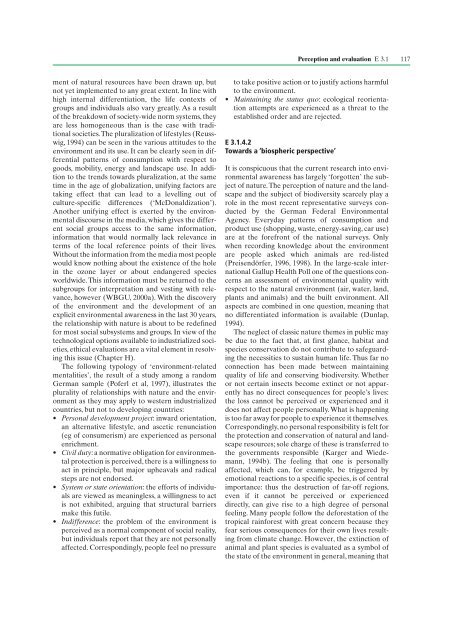Conservation and Sustainable Use of the Biosphere - WBGU
Conservation and Sustainable Use of the Biosphere - WBGU
Conservation and Sustainable Use of the Biosphere - WBGU
You also want an ePaper? Increase the reach of your titles
YUMPU automatically turns print PDFs into web optimized ePapers that Google loves.
Perception <strong>and</strong> evaluation E 3.1<br />
117<br />
ment <strong>of</strong> natural resources have been drawn up, but<br />
not yet implemented to any great extent. In line with<br />
high internal differentiation, <strong>the</strong> life contexts <strong>of</strong><br />
groups <strong>and</strong> individuals also vary greatly. As a result<br />
<strong>of</strong> <strong>the</strong> breakdown <strong>of</strong> society-wide norm systems, <strong>the</strong>y<br />
are less homogeneous than is <strong>the</strong> case with traditional<br />
societies.The pluralization <strong>of</strong> lifestyles (Reusswig,<br />
1994) can be seen in <strong>the</strong> various attitudes to <strong>the</strong><br />
environment <strong>and</strong> its use. It can be clearly seen in differential<br />
patterns <strong>of</strong> consumption with respect to<br />
goods, mobility, energy <strong>and</strong> l<strong>and</strong>scape use. In addition<br />
to <strong>the</strong> trends towards pluralization, at <strong>the</strong> same<br />
time in <strong>the</strong> age <strong>of</strong> globalization, unifying factors are<br />
taking effect that can lead to a levelling out <strong>of</strong><br />
culture-specific differences (‘McDonaldization’).<br />
Ano<strong>the</strong>r unifying effect is exerted by <strong>the</strong> environmental<br />
discourse in <strong>the</strong> media, which gives <strong>the</strong> different<br />
social groups access to <strong>the</strong> same information,<br />
information that would normally lack relevance in<br />
terms <strong>of</strong> <strong>the</strong> local reference points <strong>of</strong> <strong>the</strong>ir lives.<br />
Without <strong>the</strong> information from <strong>the</strong> media most people<br />
would know nothing about <strong>the</strong> existence <strong>of</strong> <strong>the</strong> hole<br />
in <strong>the</strong> ozone layer or about endangered species<br />
worldwide. This information must be returned to <strong>the</strong><br />
subgroups for interpretation <strong>and</strong> vesting with relevance,<br />
however (<strong>WBGU</strong>, 2000a). With <strong>the</strong> discovery<br />
<strong>of</strong> <strong>the</strong> environment <strong>and</strong> <strong>the</strong> development <strong>of</strong> an<br />
explicit environmental awareness in <strong>the</strong> last 30 years,<br />
<strong>the</strong> relationship with nature is about to be redefined<br />
for most social subsystems <strong>and</strong> groups. In view <strong>of</strong> <strong>the</strong><br />
technological options available to industrialized societies,<br />
ethical evaluations are a vital element in resolving<br />
this issue (Chapter H).<br />
The following typology <strong>of</strong> ‘environment-related<br />
mentalities’, <strong>the</strong> result <strong>of</strong> a study among a r<strong>and</strong>om<br />
German sample (P<strong>of</strong>erl et al, 1997), illustrates <strong>the</strong><br />
plurality <strong>of</strong> relationships with nature <strong>and</strong> <strong>the</strong> environment<br />
as <strong>the</strong>y may apply to western industrialized<br />
countries, but not to developing countries:<br />
• Personal development project: inward orientation,<br />
an alternative lifestyle, <strong>and</strong> ascetic renunciation<br />
(eg <strong>of</strong> consumerism) are experienced as personal<br />
enrichment.<br />
• Civil duty: a normative obligation for environmental<br />
protection is perceived, <strong>the</strong>re is a willingness to<br />
act in principle, but major upheavals <strong>and</strong> radical<br />
steps are not endorsed.<br />
• System or state orientation: <strong>the</strong> efforts <strong>of</strong> individuals<br />
are viewed as meaningless, a willingness to act<br />
is not exhibited, arguing that structural barriers<br />
make this futile.<br />
• Indifference: <strong>the</strong> problem <strong>of</strong> <strong>the</strong> environment is<br />
perceived as a normal component <strong>of</strong> social reality,<br />
but individuals report that <strong>the</strong>y are not personally<br />
affected. Correspondingly, people feel no pressure<br />
to take positive action or to justify actions harmful<br />
to <strong>the</strong> environment.<br />
• Maintaining <strong>the</strong> status quo: ecological reorientation<br />
attempts are experienced as a threat to <strong>the</strong><br />
established order <strong>and</strong> are rejected.<br />
E 3.1.4.2<br />
Towards a ‘biospheric perspective’<br />
It is conspicuous that <strong>the</strong> current research into environmental<br />
awareness has largely ‘forgotten’ <strong>the</strong> subject<br />
<strong>of</strong> nature.The perception <strong>of</strong> nature <strong>and</strong> <strong>the</strong> l<strong>and</strong>scape<br />
<strong>and</strong> <strong>the</strong> subject <strong>of</strong> biodiversity scarcely play a<br />
role in <strong>the</strong> most recent representative surveys conducted<br />
by <strong>the</strong> German Federal Environmental<br />
Agency. Everyday patterns <strong>of</strong> consumption <strong>and</strong><br />
product use (shopping, waste, energy-saving, car use)<br />
are at <strong>the</strong> forefront <strong>of</strong> <strong>the</strong> national surveys. Only<br />
when recording knowledge about <strong>the</strong> environment<br />
are people asked which animals are red-listed<br />
(Preisendörfer, 1996, 1998). In <strong>the</strong> large-scale international<br />
Gallup Health Poll one <strong>of</strong> <strong>the</strong> questions concerns<br />
an assessment <strong>of</strong> environmental quality with<br />
respect to <strong>the</strong> natural environment (air, water, l<strong>and</strong>,<br />
plants <strong>and</strong> animals) <strong>and</strong> <strong>the</strong> built environment. All<br />
aspects are combined in one question, meaning that<br />
no differentiated information is available (Dunlap,<br />
1994).<br />
The neglect <strong>of</strong> classic nature <strong>the</strong>mes in public may<br />
be due to <strong>the</strong> fact that, at first glance, habitat <strong>and</strong><br />
species conservation do not contribute to safeguarding<br />
<strong>the</strong> necessities to sustain human life. Thus far no<br />
connection has been made between maintaining<br />
quality <strong>of</strong> life <strong>and</strong> conserving biodiversity. Whe<strong>the</strong>r<br />
or not certain insects become extinct or not apparently<br />
has no direct consequences for people’s lives:<br />
<strong>the</strong> loss cannot be perceived or experienced <strong>and</strong> it<br />
does not affect people personally. What is happening<br />
is too far away for people to experience it <strong>the</strong>mselves.<br />
Correspondingly, no personal responsibility is felt for<br />
<strong>the</strong> protection <strong>and</strong> conservation <strong>of</strong> natural <strong>and</strong> l<strong>and</strong>scape<br />
resources; sole charge <strong>of</strong> <strong>the</strong>se is transferred to<br />
<strong>the</strong> governments responsible (Karger <strong>and</strong> Wiedemann,<br />
1994b). The feeling that one is personally<br />
affected, which can, for example, be triggered by<br />
emotional reactions to a specific species, is <strong>of</strong> central<br />
importance: thus <strong>the</strong> destruction <strong>of</strong> far-<strong>of</strong>f regions,<br />
even if it cannot be perceived or experienced<br />
directly, can give rise to a high degree <strong>of</strong> personal<br />
feeling. Many people follow <strong>the</strong> deforestation <strong>of</strong> <strong>the</strong><br />
tropical rainforest with great concern because <strong>the</strong>y<br />
fear serious consequences for <strong>the</strong>ir own lives resulting<br />
from climate change. However, <strong>the</strong> extinction <strong>of</strong><br />
animal <strong>and</strong> plant species is evaluated as a symbol <strong>of</strong><br />
<strong>the</strong> state <strong>of</strong> <strong>the</strong> environment in general, meaning that

















